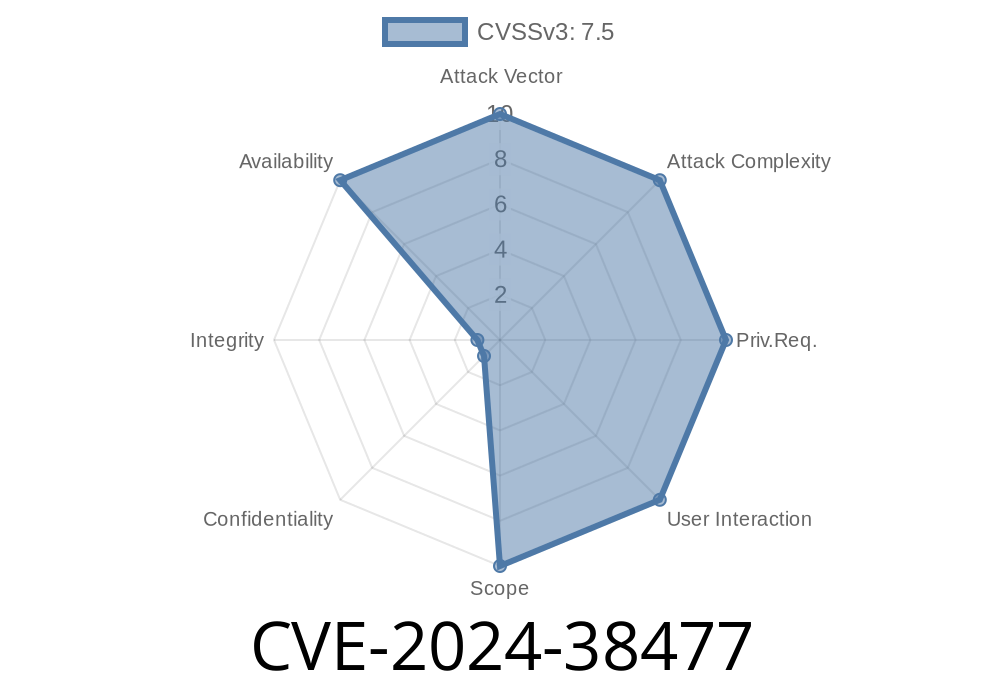If you're running an Apache HTTP Server, especially with the popular mod_proxy enabled, there's big news you shouldn’t ignore. On June 19, 2024, a vulnerability identified as CVE-2024-38477 was made public, revealing a serious flaw in how mod_proxy handles requests—a flaw that lets an attacker crash your web server with just the right crafted query. Let’s break down what you need to know, and what you should do.
What Is CVE-2024-38477?
CVE-2024-38477 is a null pointer dereference vulnerability in Apache HTTP Server’s mod_proxy module—basically, the server tries to access memory that hasn’t been set, and that causes it to crash.
Impact: Remote attacker can crash the web server with a single HTTP request (Denial of Service).
- CVE Info Link: NVD - CVE-2024-38477
- Apache Security Advisory: https://httpd.apache.org/security/vulnerabilities_24.html
How Bad Is This?
While this vulnerability doesn’t let attackers run code, steal data, or get into your system, it does let anyone shut down your Apache server. For websites and services that rely on availability, this is critical—downtime is downtime, no matter how it’s done.
Technical Background: The Crash
The problem happens when the proxy module tries to handle a request and ends up working with a NULL variable where there should be something valid. Here’s a simple look at what could be happening under the hood (simplified for clarity):
// Vulnerable pseudocode in mod_proxy (simplified)
conn_rec *backend_conn = get_backend_connection();
if (backend_conn->some_field->flag) { // If backend_conn is NULL, this crashes!
// normal proxy logic...
}
If a request is crafted to cause get_backend_connection() to return NULL, and the code does not check for that, then referencing backend_conn->some_field will crash the server process.
Exploit: Crashing Apache via the Null Pointer
To actually exploit this, an attacker needs to send an HTTP request that aligns with the bug in mod_proxy. Public exploits should not be used against systems you don't own! Here’s a proof-of-concept to show how simple it can be in practice.
Suppose your Apache is reverse-proxying to some backend and has a rule like
ProxyPass /api/ http://localhost:808/
An attacker could trigger the bug with a malformed request, such as
curl -i "http://target-site.com/whatever_path?malformed_something";
The exact request depends on configuration and unknown internal details, but attackers actively reverse engineer the patch to get the right format. According to the advisory, the attack is low effort and can be repeated to cause sustained periods of downtime.
Real-World Consequences
This may look “minor,” but in practice, a single HTTP request, from anywhere, can take down your whole Apache process—unless you use mpm_worker or mpm_event, which can reduce the severity by only crashing one thread instead of the whole service. However, Apache often runs in configurations where the crash results in a full service outage.
How to Fix CVE-2024-38477
Patch immediately:
Upgrade to version 2.4.60 (or later).
sudo apt update
sudo apt install apache2 # For Ubuntu/Debian
sudo systemctl restart apache2
or if you build from source
wget https://downloads.apache.org/httpd/httpd-2.4.60.tar.gz
tar xf httpd-2.4.60.tar.gz
cd httpd-2.4.60
./configure
make
sudo make install
Or
If you can’t upgrade immediately, disable or restrict mod_proxy and related configurations.
References and Further Reading
- Apache HTTP Server Security Vulnerabilities 2.4
- CVE-2024-38477 at NIST NVD
- mod_proxy documentation
Final Advice
CVE-2024-38477 is a strong reminder that even “basic” code errors—like forgetting to check for NULL—can have major real-world impact. If you run any public web services with Apache and mod_proxy, upgrade now, and always keep security updates high on your to-do list. Denial-of-Service attacks are simple, and this one is no exception.
Timeline
Published on: 07/01/2024 19:15:05 UTC
Last modified on: 08/21/2024 15:11:30 UTC
